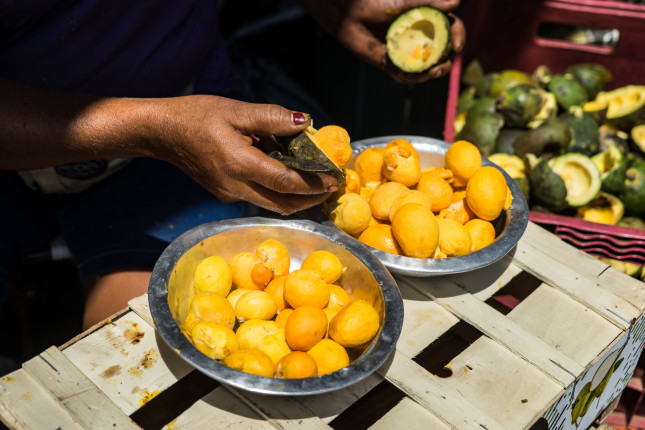-
Sharon Guynup, Mongabay
Can ‘Slow Food’ save Brazil’s fast-vanishing Cerrado savanna?
April 2, 2021 By Wilson Center Staff
It’s November in southeast Brazil, and the tall, feathery macaúba palms (Acrocomia aculeata) are beginning to drop ripe coconuts. By January, the ground is littered with them, as some 67 families that live nearby, outside the town of Jaboticatubas, get to work dragging the trove home.
This coconut serves as the lifeblood for these traditional farming communities in the Cerrado savanna in Minas Gerais state, Brazil. Archaeological sites trace its use back to at least 9,000 B.C.
Every part of the all-purpose coconut is used, from its delicious yellowish flesh to the nut at its core. It’s a favorite kids’ snack, and is used to make a highly nutritious flour, baked into bread and cookies. Livestock eat it too.
But locals also put some coconuts aside, covering them in grass and molasses and letting them ferment. Then, in April, they squeeze the pulp to extract oil to be used in lanterns and soap. Some families still sync their production with the phases of the moon and use rustic wooden presses. Some, like Raimunda Francisca Gonçalves Lopes, mix the oil with various native plants to make specially formulated medicinal soaps to treat insect bites or acne, or heal wounds. Ultimately, the coconut provides at least part of everyone’s local livelihood, and the nut at its center is a particular gem, loaded with prized cooking oil.
In 2008, these 67 families from 15 small communities formed the Amanu Association to share and improve farming and production methods, and importantly, to gain collective marketing and sales clout. They then enlisted support from the Slow Food Foundation for Biodiversity, an organization that aids sustainable agriculture projects that conserve local biodiversity and local culture.
Amanu became a registered “Slow Food Presidium,” which requires proof of environmental sustainability and fair, collaborative production practices. That designation offered the communities and families the advantage of a certified, sustainable brand, a sales platform and technical assistance.
Sources: Oilseeds and fats, Crops and Lipids and Slow Food Foundation for Biodiversity.
Photo Credit: Two basins full of peeled pequi and the hand of a woman peeling the pequi (Caryocar brasiliense), a native fruit of the Brazilian cerrado, courtesy of Rafaela Asprino, Shutterstock.com.
 A Publication of the Stimson Center.
A Publication of the Stimson Center.






